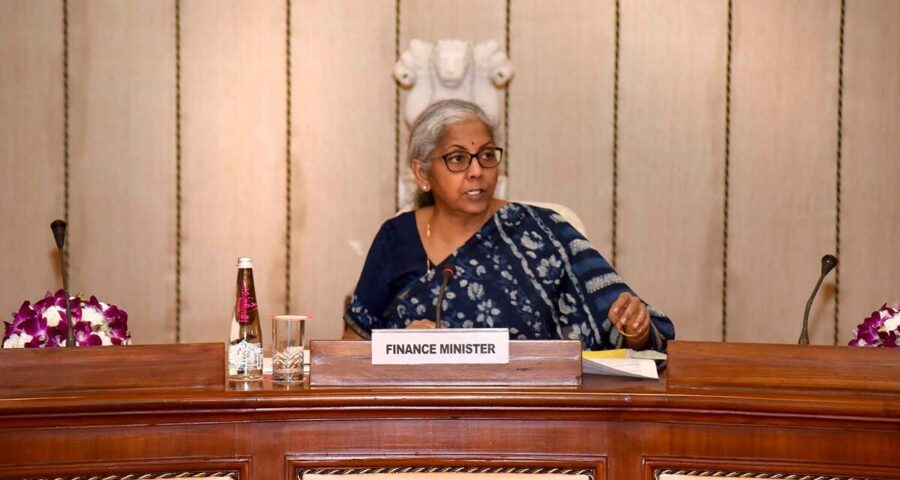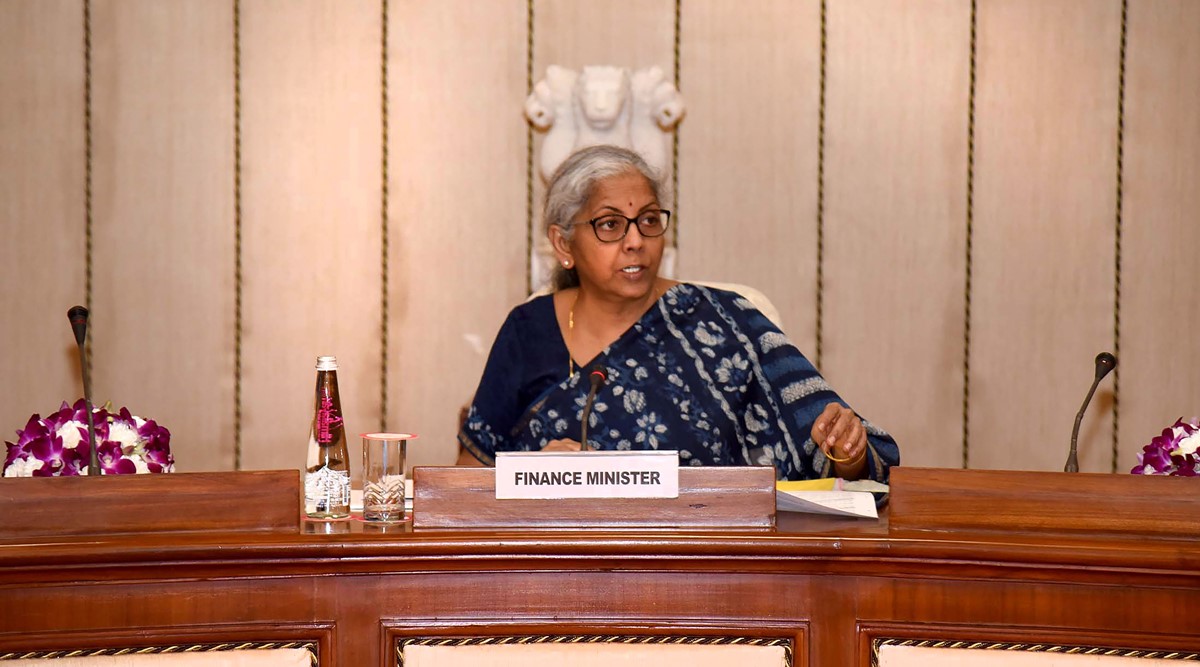Finance Minister Nirmala Sitharaman said most of the big-ticket NPAs (Non Performing Assets) will be transferred to NARCL, thereby cleaning up banks’ balance sheets and freeing up growth capital for them to support economic activity.
The government has approved extending a guarantee of Rs 30,600 crore to the National Asset Reconstruction Company Ltd (NARCL) to help clear the banking sector’s stressed assets of around Rs 2 lakh crore in a time-bound manner. A total of Rs 90,000 crore of stressed assets, against which banks have made 100 per cent provisions in their books of accounts, will be transferred to NARCL in the first phase.
Finance Minister Nirmala Sitharaman said most of the big-ticket NPAs (Non Performing Assets) will be transferred to NARCL, thereby cleaning up banks’ balance sheets and freeing up growth capital for them to support economic activity. “…this will result in banks’ balance sheets and books being cleaner, transparent, they will now be able to stand on their own and do business. They have proved it because banks are going out and raising resources (from the market),” she said.
NARCL, which is 51 per cent owned by public sector banks, will have an operational entity, India Debt Resolution Company Ltd, to manage these assets and find potential buyers for them. Banks that transfer their stressed assets will get 15 per cent of the value in cash and 85 per cent as tradable security receipts. The government guarantee will cover the gap between the face value of the security receipts and realised value of the assets when eventually sold to the prospective buyers.
https://youtube.com/watch?v=kbT0WxX1AFE%3Fversion%3D3%26%23038%3Brel%3D1%26%23038%3Bshowsearch%3D0%26%23038%3Bshowinfo%3D1%26%23038%3Biv_load_policy%3D1%26%23038%3Bfs%3D1%26%23038%3Bhl%3Den-US%26%23038%3Bautohide%3D2%26%23038%3Bwmode%3Dtransparent
A guarantee helps in improving the value of security receipts, their liquidity and tradability. “For the SRs (security receipts) to hold on and have their value intact, there is a need for the government to backstop…that’s why Cabinet has given clearance to provide guarantee (in its meeting on Wednesday),” the minister said.
The guarantee is in the form of the “contingent liability” and does not involve any immediate cash outgo for the Central government, Department of Financial Services Secretary Debasish Panda clarified. He said conditions have been built in the structure to ensure a speedy and time-bound resolution. The guarantee is valid for five years and the guarantee fee that NARCL pays to the government will keep on rising with each passing year. The guarantee can be invoked only in case of resolution of liquidation of the assets.
“This will ensure that a secondary market gets developed for such Securitized Receipts and banks will be able to trade the same. Second, there is an inbuilt incentive structure within the overall framework that will drive both banks and NARCL to ensure resolution of the bad loans within a period of 5 years. Such elements have been missing in the functioning of the existing ARCs and hence we feel that large assets that have hitherto been left unaddressed will see resolution going ahead,” FICCI President Uday Shankar said.
In anticipation of the announcement, NIFTY PSU Bank index rose 5.43 per cent Thursday, with PSU banks’ shares jumping up to 13.86 per cent at the National Stock Exchange.
Since 2015, Sitharaman said, the government has worked on four Rs — Recognition, Resolution, Recapitalisation and Reforms — to resurrect the public sector banks, and this process has now come full circle. Resolution, recovery of NPAs, healthy capital infusion has been down alongside a series of reforms.
“In the last six financial years…banks have recovered Rs 5,01,479 crore, of which Rs 3.1 lakh crore have been recovered since March 2018. In 2018-19 alone, a record of Rs 1.2 lakh crore were recovered. Recovery also includes from the so called written off accounts,” she said.
The government has infused Rs 3.06 lakh crore in state-owned banks in five years between 2017-18 and 2021-22, and taken a series of reforms to strengthen banks, improve debt resolution and recovery and taken steps towards fraud detection and prevention, she added.
A government-backed ARC was proposed in this year’s Budget to take over the stressed debt of banks and manage these in a market-led way. Banks are putting in equity of around Rs 6,000 crore in the NARCL, which will also have private sector banks, NBFCs and financial institutions as shareholders. Public sector banks will own 49 per cent equity in India Debt Resolution Company Ltd, the operating entity comprising professionals that will manage and eventually sell the underlying assets.
Panda exuded confidence this market-led resolution mechanism, supported by the government, will help to speedily resolve stressed assets. Unlike in the past where resolutions were held up due to differences among banks, “now it’s actually the banks who are more interested and raring to go,” he said. The assets can eventually be sold to Alternate Investment Funds and other potential investors to realise their full value.
NARCL was registered with the Registrar of Companies (RoC) in Mumbai on July 7 and the Reserve Bank of India licence is expected soon for the company. Most of the existing private asset reconstruction companies are thinly capitalised and could not deal with the scope of NPA problem, therefore, NARCL has been set up to deal with stressed assets in a market-led way but supported by the government.
NARCL, also known as a bad bank, has eight public sector banks as its shareholders. The company currently has four directors on its board Sunil Mehta, Padmakumar Madhavan Nair, Salee Sukumaran Nair, Ajit Krishnan Nair.
According to the Articles of Association of the company filed with the RoC, while SBI, Union Bank of India, Bank of Baroda and Indian Bank own 99 lakh shares each, Canara Bank owns 1.2 crore shares. Other shareholders include — Punjab National Bank (90 lakh shares), Bank of India (90 lakh shares) and Bank of Maharashtra (50 lakh shares). The authorised share capital of the company is Rs 100 crore divided into 10 crore shares of Rs 10 each.
“The sovereign guarantee will support the regulatory provisioning requirement of the RBI and allow the banks to free up that capital without the burden of additional provisioning, effectively allowing more participation from the banks to resolve their NPAs through the bad bank. The success of the bad bank, however, will depend on the implementation and management of the transferred NPAs,” said Anish Mashruwala, Partner, J Sagar Associates.
“NARCL will commence clearing balance sheets of banks, and it is hoped that this will finally end the twin balance sheet problem in the infrastructure sector. NARCL operations will also create a shelf of monetisable assets, and these can be leveraged by NARCL’s AMC for de-risking, and creating value for both O&M entities and their lenders,” said Davinder Sandhu, Chairman and Co-Founder, Primus Partners.
“The high level of provisioning by public sector banks of their stressed assets calls for measures to clean up the bank books. An Asset Reconstruction Company Limited and Asset Management Company would be set up to consolidate and take over the existing stressed debt and then manage and dispose of the assets to Alternate Investment Funds and other potential investors for eventual value realisation,” Sitharaman had said while presenting Union Budget 2021-22 in February
Source: Read Full Article


